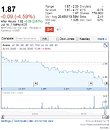Thursday, July 16th 2015

AMD Now Almost Worth A Quarter of What it Paid for ATI
It's been gloomy at the markets in the wake of the European economic crisis. This along with a revised quarterly outlook released by the company, hit AMD very hard over the past week. The AMD stock opened to a stock price of 1.87 down -0.09 or -4.59% at the time of writing this report, which sets the company's market capitalization at $1.53 billion. This is almost a quarter of what AMD paid to acquire ATI Technology, about a decade ago ($5.60 billion). Earlier this month, AMD took a steep fall of -15.59%, seeing its market cap drop by a quarter.
Intel is now worth $140.8 billion (92 times more), and NVIDIA $10.7 billion (7 times more). Among the issues affecting AMD are decline in PC sales and stiff competition. However, reasonably positive earnings put out by Intel disproves AMD's excuse that the market is to blame for bad performance, and the company could slide even further, hitting its all-time-low at the financial markets. The company will host an earnings call later today.
Source:
Google Finance
Intel is now worth $140.8 billion (92 times more), and NVIDIA $10.7 billion (7 times more). Among the issues affecting AMD are decline in PC sales and stiff competition. However, reasonably positive earnings put out by Intel disproves AMD's excuse that the market is to blame for bad performance, and the company could slide even further, hitting its all-time-low at the financial markets. The company will host an earnings call later today.

136 Comments on AMD Now Almost Worth A Quarter of What it Paid for ATI
I guess their accounting team must be FURYious.
And processors that can perform well and are priced well....
The Athlon 64 was released over 10 years ago It was a Pentium 4 killer...
AMD needs another Athlon 64.... Or they could go the way of mips and SGI
We keep waiting for something to happen and let down over and over.
Intel already has an answer to anything AMD can think of at this point.
They have enough money to survive the next year until Zen arrives and they will also probably see an increase in their income from GPUs in the next one or two quarters. The fact that TSMC is lowering the prices of 28nm by 10% will help them to make a little extra profit. Intel is also slowing down, so the only question mark is Zen's IPC performance and efficiency. If they come out with something at least as good as
Intel Haswell(too optimistic, probably Ivy Bridge would have been closer to reality), their share price and valuation will go much higher, because their products will become much more competitive than they are today.I'm guessing that AMD will have to deliver unequivocally - performance as advertised, on time, and fully supported (feature set, firmware, drivers, production ramp) for OEMs to hitch their wagons to AMD's star....and hope like hell Intel slip up.
I'm always very careful not to make the wrong judgement, but Intel has been playing with the desktop customer for more than 2 generations. Crappy CPU assembly and minimal performance gains are very bad for their name, but people still buy them like candy. Just yesterday I was testing an i7-4770 on stock speeds and priming temps were more than 100C with an air conditioned room, while in the same room an 8350 @ 4.5GHz did not even reach 60C, while gaming performance was identical. and the price is 3 times less.
The geeks here are an insignificant minority in the global market. AMD's decline can only be blamed on fanboys if you are one yourself. Stocks don't listen to fanboys, they listen to market presence and profitability.
It's brutally naive to assume AMD's decline is anything other than lack of product and lack of product perception, combined with possible major mismanagement.
This is not a third party fault. Similarly, Intel do just enough to stay far out in front. AMD's lack of product threat means they can work on minimal R&D expenditure with minimal product improvement.
Don't get me wrong (if you do you're illogical) I don't want AMD to disappear. Competition is required for better service and product. I want to see AMD taken over and used properly to create segment desirable products, across a whole range of applications.
They're not done yet but they're getting really close to it.
AMD was a good company from about 1997-2005 (K6 to K8). Before and after, not so much.They likely only make pennies on the dollar for every unit shipped and Global Foundries probably gets most of the profit margin. AMD killed itself when it was forced to sell its foundries.